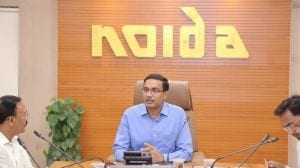E-banking? Think egg
Last winter, with her boyfriend 8220;dragging his feet8221; about a commitment and her 36th birthday come and gone, Megan Griswold decided...

Last winter, with her boyfriend 8220;dragging his feet8221; about a commitment and her 36th birthday come and gone, Megan Griswold decided it was time to frankly assess her prospects for having a child.
Within months, the Seattle acupuncturist was on a plane headed for Los Angeles. There, she had several dozen eggs withdrawn from her ovaries and frozen for possible use down the road. 8220;I would like to be a mother, the anxiety was starting to build,8221; she says.
Griswold is among the first wave of women poised to transform female fertility. Until recently, only healthy volunteers in clinical trials or women about to undergo cancer treatment have had eggs removed and frozen for possible future fertilization and implantation.
But as the ability to successfully thaw and use the eggs has grown, so, too, has the demand for the procedure and doctors8217; willingness to market it to healthy women. Now women who aren8217;t ready to become mothers, but who want to preserve that option, are signing up to have some of their eggs removed and frozen.
Nationwide, the number of clinics offering egg banking is expected to double this year from the handful of centers that have pioneered the technology. Huntington Reproductive Center in Pasadena, which Griswold used, is one of three egg banks to open in the last few months in California. These banks join a few other California clinics that have been offering egg freezing for some time.
The trend has the potential to rewrite the script for young adulthood, allowing women to further defer marriage and motherhood. Female fertility peaks at age 27 and by age 40, the chance of getting pregnant is less than 10 percent. By freezing their eggs, women can be relatively free of their biological clock8217;8217; stressful drumbeat.
8220;I wanted to separate my desire to have kids with my timing for choosing to be with someone,8221; Griswold says. 8220;It has helped relieve the pressure that fertility is clouding your judgment about whether to be with someone. You want to have children with the right person.8221;
And they8217;re not the only takers. Extend Fertility, a national company that partners with infertility clinics to offer egg freezing, says a market survey it conducted found that 25 percent of women seriously interested in egg freezing were married and 13 per cent had children. Divorced women with children who think they may want to have another child someday also are potential clients.
But egg freezing 8212; oocyte cryopreservation 8212; has produced between 100 and 200 babies worldwide. But it is typically not recommended after age 37. It takes a lot of frozen eggs to produce a single baby. Most clinics recommend a woman store at least 30 eggs.
8220;We8217;ve got the recipe, now we need to fine-tune it,8221; says Dr. John Jain, a reproductive endocrinologist at USC Fertility, which recently announced a triplet pregnancy with frozen eggs.
LAT-WP
- 01
- 02
- 03
- 04
- 05































